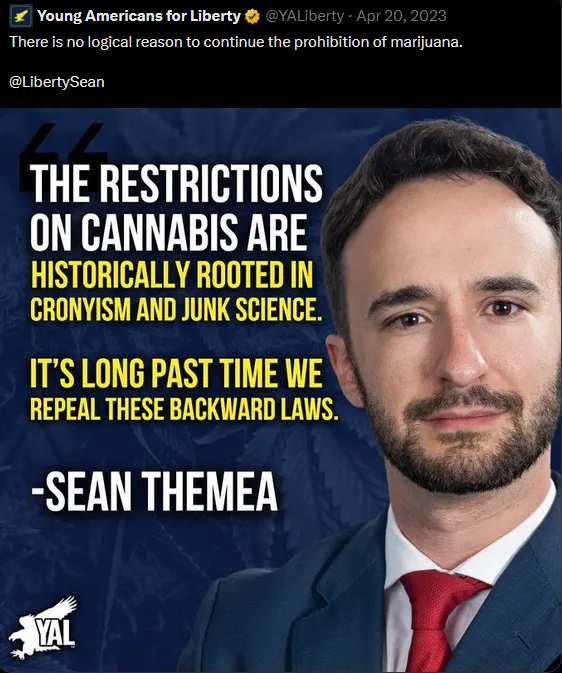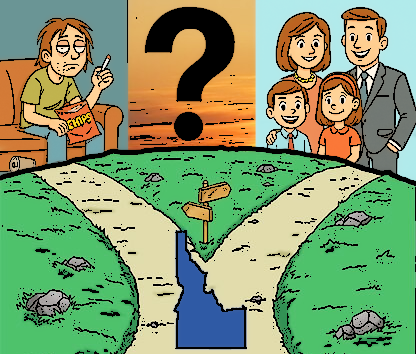Should the government have the authority to restrict what you put in your own body, without regard to second- and third-order effects? That is the central debate over marijuana, which has flared up again as the Trump Administration considers changing how the federal government classifies the drug.
The cannabis family of plants—cannabis sativa, cannabis indica, and cannabis ruderalis—are psychoactive and have been cultivated for thousands of years. Chemicals produced by these plants, including tetrahydrocannabinol (THC) and cannabidiol (CBD), have various effects on human physiology. Of the two, THC is the more dangerous, with effects that can include short-term memory loss, anxiety, paranoia, increased appetite, and decreased motivation. On the other hand, many claim that CBD can treat anxiety, psychosis, and pain, though studies are mixed.
The first U.S. government restrictions on cannabis came in 1906 via the Pharmacy Act, which regulated substances considered poisons. The Marihuana Tax Act of 1937 added further restrictions as well as taxes on cannabis products such as hemp. An over-the-top anti-drug film called Reefer Madness was filmed in 1936 and released in 1938 as an exploitation film.
Attitudes began changing in the 1960s and ’70s, with polls showing majority support for legalization by around 2010. In the early years of the 21st century, states began allowing so-called medicinal use in defiance of federal laws. In 2012, my former home state of Washington became the first state to legalize marijuana for recreational use after voters approved a ballot initiative.
Libertarians on both the right and the left have long supported decriminalization or even legalization of drugs such as marijuana. Indeed, I’ve noticed that the freedom to use drugs is often the top priority of many outspoken libertarians. At the Libertarian Party presidential debate in 2016, Austin Peterson was booed for saying people should not be allowed to sell heroin to 5-year-olds.
Libertarian organizations like Young Americans for Liberty (YAL) continue to support legalization. Just two years ago, on April 20 (for some reasons, “420” has long been associated with marijuana usage), YAL tweeted a quote from its chief operating officer Sean Themea calling for repeal of laws restricting cannabis usage.

My quote-tweet of that post last weekend, in which I said that Idaho says no to marijuana, saw significant engagement. Most replies agreed with my position.
I have wrestled with the question of whether our government should have the authority to regulate what we do with our own bodies. Just over a year ago, I wrote about the idea of regulating vice:
The problem with regulating vice is that while all people are equal under the law, not all people are equal in responsibility, wisdom, moderation, temperance, and physical susceptibility to addiction. One man can have a glass of beer each evening and be fine, while another can’t stop with just one. How can the law take everyone into account?
The same goes for every other vice that is regulated or banned at state or federal levels. Some people can handle gambling for fun, while others are seized by compulsion and empty their family’s savings accounts. Smoking has been an American tradition since the beginning, and it has caused many health problems along the way. However, I know nonagenarians who have smoked all their lives and are basically fine.
Some people can handle the occasional joint of marijuana, while others become addicted and lose all drive and ambition. I even know of some who can handle much stronger drugs in very small amounts, though I’m sure that’s a tiny percentage of that population.
Libertarians argue from first principles that one person does not have the right to tell another what he or she can or cannot ingest. They call drug usage a “victimless crime.” Yet a decade and a half into this experiment with legalization has shown that it is not victimless. Rampant drug use has awful second- and third-order effects that destroy families and communities. If marijuana is illegal, some people will still smoke it, but the barriers are much higher than they are now, which means fewer people will destroy their lives with that addiction.
In my article on vice, I brought up gambling as another of these gray areas. Gambling has always destroyed the lives of a certain percentage of people unable to control themselves, but the barriers to entry were once fairly high. A gambler had to seek out a casino or racetrack to engage in his vice, but today you can throw away your life savings on prop bets via mobile phone apps. Is that good for society?
I don’t believe it’s good for society to legalize marijuana in Idaho. Always remember Chesterton’s Fence: if you come across a fence in the woods, you should figure out why it was placed there before tearing it down. Our great-grandfathers didn’t ban cannabis because they were fun-hating authoritarians; they did so because they saw the damage that unchecked drug abuse caused their communities.
It was one thing for libertarians to argue for legalization from first principles in 2010, after multiple generations in which drug abuse was not rampant in society. Yet in 2025, we can see the effects legalization has had in other states: the side effects, the destroyed families, the degraded neighborhoods, and, of course, the awful smell. Travis Corcoran, an anarcho-libertarian state representative in New Hampshire, supports legalization but admits the smell is a legitimate negative externality that must be addressed.
Corcoran also rejected the idea that issues such as marijuana legalization are about nothing more than the proper role of government:
Anytime someone says “THE issue is”, they are trying to narrow the debate to the one axis that they care most about / that they think they can win on.
The vast majority of topics have dozens of facets that are all valid.
Influencer Mike Cernovich, who once supported legalization, has come out against it due to its obvious effects. Today he tweeted:
I wish the libertarians had been right. We have mostly done what they wanted. Now the cities are overrun with druggie zombies after ending the “abusive” war on drugs. Gambling, Kratom, CBD everywhere. Society is [expletive] gross. They were wrong. The church ladies were right.
As a nation, we ignored Chesterton’s Fence, tore down prohibitions on illicit drug use, and now we’re reaping the consequences.
One reason I’m not a libertarian is because I don’t believe we should ignore the negative consequences of human behavior. The “conserving” part of conservatism means holding on to the good—and a safe, clean society is good. I thought Rep. Clint Hostetler put it well in a recent online debate:
I’m for preserving or conserving what is in place to keep or attempt to keep a moral and virtuous society for our families and children. I’ve been there done that and seen how it plays out, we have plenty of blue states to look at for precedent.
Radio host Bill Colley, who says he was once a card-carrying member of the Libertarian Party, posted a short article yesterday warning against YAL’s influence in Idaho politics. He pointedly asked that while it’s true YAL has not promoted marijuana legalization in Idaho, will they take a position on next year’s citizen initiative to legalize the drug?
I would go a step further and ask what YAL would do if their wildest dreams came true and they had a critical mass of legislators on their side. Would they start pushing legalization in Idaho? It’s a conundrum for those who currently count on YAL’s support. As Colley put it in a Substack post this week:
The organization appears to have a political action wing and has poured money into Idaho political activities in the past. Some conservative legislators have benefited. I don’t believe they support smoking dope. Can you have your cake and eat it?
You say you want moral people, but then ignore what looks like trouble. In other words, you compromise. As do many Republicans allied with YAL, when those same Republicans are opposed to legalization. How do you square that difference? You claim you won’t compromise with Republicans who work for lobbyists, or who take money from special interests, but for the stoners?
Can we expect Facebook ads tarring Idaho conservatives who oppose marijuana legalization as “traitors” to liberty in the near future?
Idaho has thus far held the line while the rest of the country has gone to pot. Will we continue, or will we waver? In recent years, a few legislators have filed personal bills to allow medicinal use, but the Legislature also passed a proposed constitutional amendment this year that would make it impossible for voters to legalize drugs via ballot initiative. Ironically, that proposal will be competing with a legalization initiative next year, should it receive enough signatures to get on the November 2026 ballot. Which way will Idaho go?
Gem State Chronicle is a reader-supported publication. To receive new posts and support my work, consider becoming a free or paid subscriber.
About Brian Almon
Brian Almon is the Editor of the Gem State Chronicle. He also serves as Chairman of the District 14 Republican Party and is a trustee of the Eagle Public Library Board. He lives with his wife and five children in Eagle.













